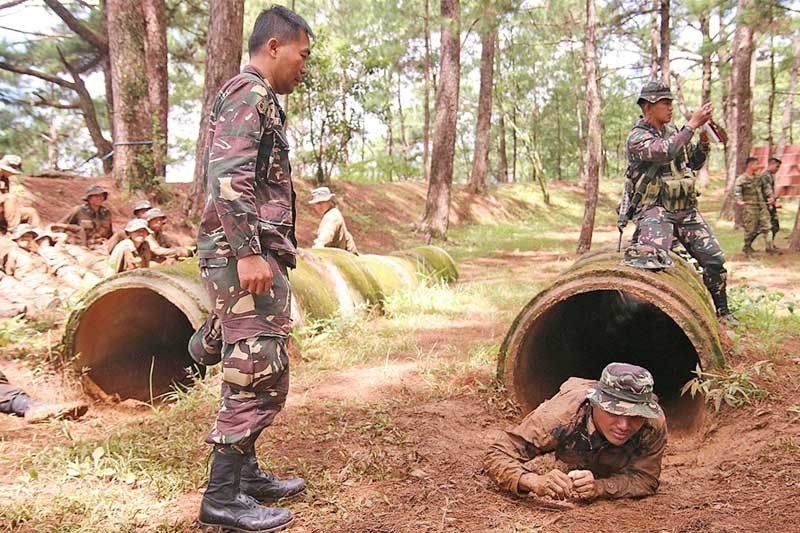Restore ROTC in college to avoid legal tangles


ROTC, or Reserve Officers Training Corps, is not for inculcation of nationalism. Trainees are expected to have imbibed love of country and been introduced to Filipino history and culture starting age five. ROTC is for citizens’ military preparedness to defend the motherland. It includes training in combat, marksmanship, artillery, map-reading, and other basics of soldiery. ROTC thus is for adults. If enforced in Grades 11 and 12, or ages 16 to 17, it would violate international law against child soldiers. For ROTC to succeed, it must be in college.
ROTC must not be limited to training. Its goal should be readiness for mobilization. Graduates will be given ranks and serial numbers as part of the reserve Armed Forces. They will be assigned to squads, platoons, companies, battalions, brigades, and divisions. Deployment shall be in emergencies and for contingencies. Modern times call for modern training and mobilization. Foreseeable situations are external or territorial defense, internal defense or peace and order, and disaster risk reduction and management.
Those two issues – age and aim – are at the core of debates on the reinstitution of compulsory ROTC. Other matters, like inclusion of all genders or physique, are supposed to have been hurdled in various bills in Congress. The Constitution does not distinguish between male and female, or able-bodied and handicapped. It plainly requires military training for all Filipinos, to comprise a citizens’ armed force. In defense of the State, citizens may be called upon to render personal military or civil service. The old ROTC law needs updating. The number of military reservists has been dwindling. The National Service Training Program (NSTP), which made ROTC optional in 2002, needs replacing. The Commission on Higher Education has deemed it a failed undertaking. Today’s need is for a citizen service law.
The age issue is over what school level ROTC must be re-imposed. The House of Reps has approved a version for Grades 11 and 12, or senior high school. Defeated was a bill, by Speaker Gloria Macapagal Arroyo, that preferred first and second years of college or vocational course. Pending at the Senate are counterpart bills for Grades 11 and 12. Standing out is Sen. Aquilino Pimentel III’s version akin to Arroyo’s, or for tertiary level.
The younger age is deemed to break the Optional Protocol on the Involvement of Children in Armed Conflict. OPAC stems from the UN Convention on the Rights of the Child. State-Parties, like the Philippines, must ensure that persons below 18 are not recruited or conscripted into any armed group. States may not send children to the battlefield, and must criminalize such child abuse. Legislating compulsory ROTC for reservists in Grades 11 and 12 is thus a gray area.
The Enhanced Basic Education Program, or K-12 Law, itself specifies the ages of enrollees. Kindergarten pupils must be at least five years old, Grade 1 students at least six, Grade 11 at least 16, and Grade 12 at least 17. The age cutoff is June 1 of the school year. So Grade 12 students who will finish ROTC would still be 17 upon school graduation the following March. Since reinstituted ROTC would be a requirement for high school graduation, the OPAC will be breached.
The University of the Philippines Vanguard Inc. (UPVI), consisting of finishers of Advance ROTC, points up the risk. If enacted in Grades 11 and 12, the restoration of mandatory ROTC can be questioned in court, say UPVI chairman Gilbert Raymund Reyes and national commandant Guido Alfredo Delgado. International pacts like the OPAC form part of the law of the land. One cannot claim that ROTC Philippine-style is purely internal; the Vienna Convention on the Law of Treaties compels signatories to enforce them. Besides, the old ROTC law that is sought for modernization already states that reservists of the Armed Forces must be at least 18 years of age.
Two arguments attempt to dismiss the age issue. One is that Grades 11 and 12 students of today were the college freshmen and sophomores of yesteryears. Both were 16 to 17, before K-12 added two years to the basic curriculum. But that was also before the Philippines ratified the OPAC in 2003 and made ROTC optional in 2002. It simply doesn’t work today. The other option is grayer. A proviso is inserted to the effect that, while ROTC trainees shall be registered upon graduation, such registration shall not be construed as enlistment in the reserve Armed Forces. What then is the point of registration, if not for enlistment and mobilization as reservists?
The mobilization part is crucial. Pimentel’s Citizen Service Bill will form a commission to oversee training for deployment in emergencies and contingencies. ROTC cadets of old were mobilized for aid during floods and election precinct guard. Graduates comprised regional reserve forces also for disaster relief. If not for battle against invaders, future ROTC trainees’ role will be mostly in disaster mitigation and prevention. That could include enforcement once and for all of the law requiring all barangays to have water impoundments against floods and droughts. The commission shall have the extra duty to investigate corruption, hazing, and sexual harassment that marred the old ROTC.
* * *
Catch Sapol radio show, Saturdays, 8-10 a.m., DWIZ (882-AM).
Gotcha archives on Facebook: https://www.facebook.com/pages/Jarius-Bondoc/1376602159218459, or The STAR website https://www.philstar.com/columns/134276/gotcha
- Latest
- Trending
























